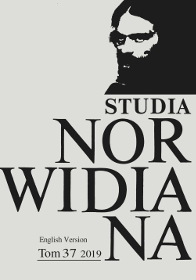“Eagle? It is not half-turtle, half-thunder”. The problem of romantic irony in Vade-mecum
Abstrakt
Numerous studies on the works composing the volume Vade-mecum confirm that although the individual poems are characterised by great ethical sensitivity and strong moral rigour, it is difficult to clearly define the worldview of Norwid’s work. The author of the article proposes an interpretation of Vade-mecum, taking into account the problem of Romantic irony. The poet uses irony as a tool to reach the elusive Truth. For him, ironic distance is not distancing himself from the views professed in particular works, but an awareness of the imperfections of a language which may falsify those views. Irony helps him in his quest to “give the right word to the thing”, not allowing the language to simplify or reduce the moral statements expressed in individual works.
Bibliografia
Djakowska A., O słowach, które się ruszają, [in:] S. Kierkegaard, O pojęciu ironii z nieustającym odniesieniem do Sokratesa, trans. A. Djakowska, Warszawa 1999.
Eagleton T., Koniec teorii, trans. B. Kuźniarz, Warszawa 2012.
Fert J., Wstęp, [in:] C. Norwid, Vade-mecum, compiled by J. Fert, Wrocław 1990.
Gomulicki J.W., „Vade-mecum” jako Norwidowa summa poetycka, [in:] M. Inglot, Cyprian Norwid, Warszawa 1991.
Inglot M., Arcydzieło Norwidowskiej liryki (rzecz o „Vade-mecum”), [in:] idem, Cyprian Norwid, Warszawa 1991.
Kierkegaard S., O pojęciu ironii z nieustającym odniesieniem do Sokratesa, trans. A. Djakowska, Warszawa 1999.
Kleiner J., Zarys dziejów literatury polskiej. Od początków do 1918 r. revised and supplemented by S. Kawyn, J. Spytkowski, T. Ulewicz, Wrocław 1968.
Lijewska E., Norwid i Kierkegaard – czy spotkanie było możliwe?, „Poznańskie Studia Polonistyczne. Seria literacka” 18(2011), pp. 271-282.
Mitosek Z., Teorie badań literackich, Warszawa 2005.
Norwid C., Vade-mecum, compiled by J. Fert, Wrocław 1990.
Pushkin A., Eugene Onegin, trans. H. Spalding, London 1881. Retrieved from: https://www.gutenberg.org/files/23997/23997-h/23997-h.htm [Accessed on 7 November 2020].
Rzońca W., Norwid – największy poeta drugiej połowy XIX w., „Przegląd Humanistyczny” 6(2007), pp. 35-43.
Szturc W., Ironia romantyczna. Pojęcie, granice i poetyka, Warszawa 1992.
Trojanowiczowa Z., Ostatni spór romantyczny. Cyprian Norwid – Julian Klaczko, Warszawa 1981.
Trybuś K., „Stary poeta.” Studia o Norwidzie, Poznań 2000.
Trybuś K., Pamięć romantyzmu. Studia nie tylko z przeszłości, Poznań 2011.
Witkowska A., Wielcy romantycy polscy. Sylwetki. Mickiewicz, Słowacki, Krasiński, Norwid, Warszawa 1980.
Wyka K., Norwid nieobecny, [in:] idem, Cyprian Norwid. Studia, artykuły, recenzje, Kraków 1989.
Wyka K., Pochwała niejasności Norwida, ibid.
Copyright (c) 2019 Studia Norwidiana

Utwór dostępny jest na licencji Creative Commons Uznanie autorstwa – Użycie niekomercyjne – Bez utworów zależnych 4.0 Międzynarodowe.





